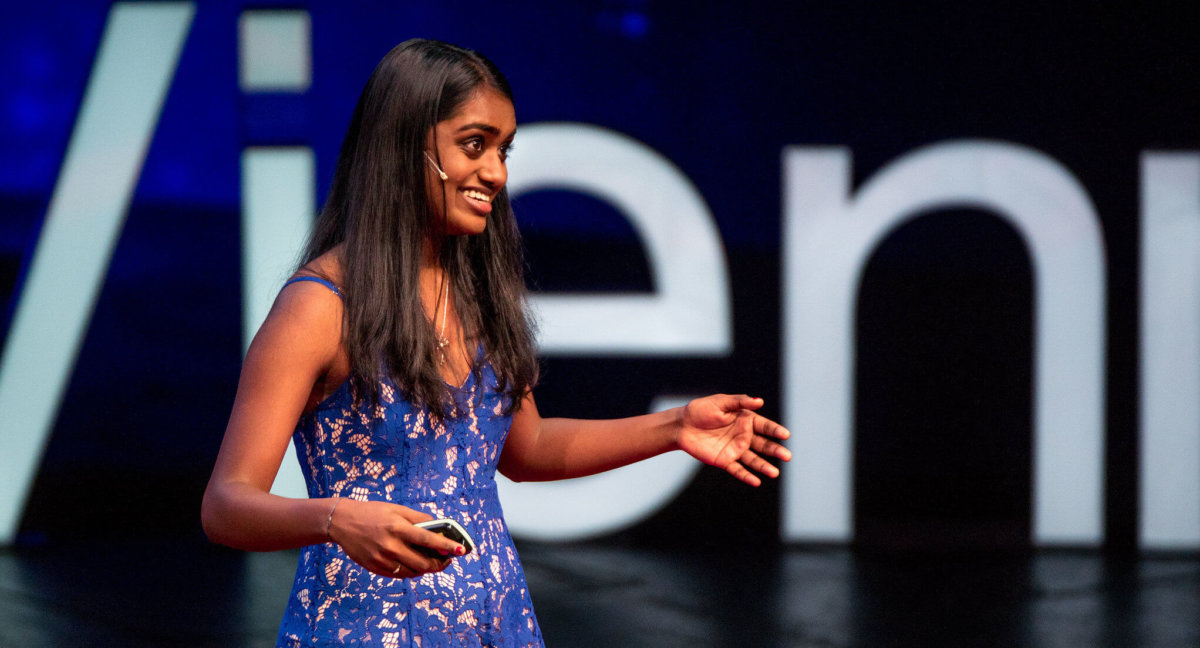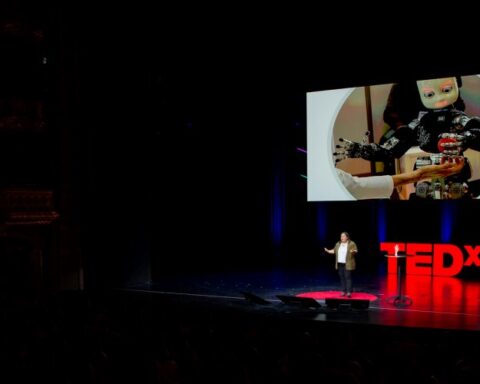For the entire month of March, TEDxVienna ran the #womensmarch campaign, highlighting women in leadership in connection to the United Nations International Women’s Day. On March 27, TEDxVienna curator Alina Nikolaou hosted our first-ever Instagram Live with the incredibly inspiring Kavya Kopparapu, a former TEDxVienna speaker from our 2018 event.
Kavya is a computer scientist and founder of the nonprofit Girls Computing League, an organization that aims to empower students to become leaders by making emerging technology education accessible to all. The organization emphasizes the importance of inclusion in terms of gender, race, and socio-economic status. It’s all about instilling long-term change for future generations.
Kavya was named one of TIME’s Most Influential Teens of 2018, and what she has accomplished at just 20 years old is beyond inspiring. While still a dedicated student at Harvard University, Kavya has already managed to make a significant impact on medicine with the development of GlioVision. GlioVision is an artificial intelligence (AI) platform that uses images of glioblastoma tumors to draw molecular and genetic information with 100% accuracy.
In our Instagram Live interview with Kavya, we learned more about her nonprofit, her innovations in AI and medicine, and the advice she gives to young students who want to get involved in computer science.
Here’s an excerpt from the interview:
Alina: I am going to pick one of the quotes from your talk that I found very interesting and I just want to know to what degree you still think this way? The quote is as follows:
“Having a young perspective has really enabled me to view the field as how it can be in the future, not how it is right now”
Kavya: I definitely agree. I think it is even more true now. I think there’s been this huge wave of digitization and an influence of AI and so many incredible organizations that have kind of sprung up to ensure that young people have access to this type of education.
So I think it’s really important to come in with the knowledge that you are very passionate about a specific area or really passionate about an application and really ready to use the technology in any way necessary to enact that vision.
I think that’s something that is very characteristic of being a newcomer to a field or being a young person in a field which is, the entire world of possibilities is out there and it’s really up to you and how you can use your imagination to enact your vision, so yeah, I think it’s totally true.
Alina: Do you plan to write a book in the future?
Kavya: Actually, yes. It’s something that I’ve wanted to do for a long time. I think there are a lot of insights and things that I’ve gotten as a result of talking to so many incredible people, having so many incredible opportunities like talking at TEDxVienna. And I take them all every day, I’ll be like writing stuff in a journal that I have full of ideas that I’ll hopefully put into a book at some point.
Alina: How are you fighting against the underrepresentation of people of color and women in science?
Kavya: Great question, the approach we have taken at Girls Computing League to this specific issue is to partner with different organizations that are already facilitating different communities with women of color. This means that both in a tech sense, but also not in a tech sense, bringing the technology into spaces that they feel most comfortable.
So, for us for example, this has meant partnering with public housing districts in the US, which have a significant portion of residents living in public housing who are people of color. And in these spaces, there are community centers, cafeterias, and technology areas that are already spaces in which these young women are already familiar with and interacting in.
Our philosophy has really been to take the burden off of them to find out about opportunities and to travel to those opportunities. We would rather bring those opportunities to them, in the environment that they feel most comfortable in.
Also, whenever we have these different events, to always include a speaker that came from a similar background or has a similar identity as them, because it is really easy to visualize what a career in technology might look like if you see someone telling you about it who looks like you.
That’s been a fundamental value that I’ve held in the Girls Computing League and so we’ve been trying to work with these different community centers that already have strong relationships with this community of individuals.
Alina: How long do you think it will take for AI to be used in medicine in a “mainstream” way?
Kavya: I think the answer is that it’s already being used in a pretty mainstream way, it is starting to pick up. Especially in the US, I think there have already been regulatory channels that allow the approval of AI technologies in healthcare, in the medical domain.
Especially, we’ve seen this in a Covid setting. Someone just asked if I am doing any Covid- related research. I am. I am working on research to see if we can take information about our digital footprint, whether that would be mobility data, web search data, or just answering participatory health surveys online on aggregate to predict the spread of an epidemic like Covid using AI.
But I think even that type of research just really points to a translational idea that AI is being implemented in the real world and will be. [… ] I think there are so many incredible examples of AI being used in the real world from breast cancer screening to analyzing radiology images. I think they are the key applications right now and I think that’s only going to continue to grow in the future so it already is being implemented, which is exciting to see.
Alina: So Kavya, as we close this call: What advice would you give to young women who watch this and are maybe curious about getting into computer science? What would be your advice for them?
Kavya: The first thing is to either find a community or form a community yourself. For me, when I was learning computer science, I relied a lot on my brother, who is also really interested in this area. Having someone else who was learning this at the same time that I was, made it exciting and fun.
There are a lot of computer science communities, such as the Girls Computing League, so join them. Find other incredible women who are also interested in learning about computer science. I think that makes the experience more enjoyable.
Computer science is really all about application, right? So you write a program to do something in the real world, or you train an AI model to do something to effect some kind of change somewhere. So find what you are really passionate about and use computer science as a vehicle to get at that one thing.
For me, it was medicine. For my brother, it was economics, and for many people, it’s a lot of different things. Find something that you are passionate about and make your pursuit in computer science about that thing as well.
Then I think my last piece of advice is one that my mom has always told me:
“The worst thing that anyone could ever say is no”.
You should always reach out for help, advice, or mentorship from different people. I have really taken this to heart. A lot of the research that I have been able to do when I was a high-schooler with no network was because I was able to cold-email people and ask them for help. People are going to say no, but when people do say yes, they become mentors for life.
I am still in touch with a lot of people who agreed to mentor me back when I was 15 years old, and they have really stuck with and been huge drivers in my own personal change, and the way that I have been able to enact change in my community.
If there is someone who you admire, who you’re interested in working with, or who may have access to resources you don’t currently have, just ask them. Everyone, especially in the computer science community, is invested in supporting younger students’ growth, and a lot of the time, they will say yes.
If you would like to listen to the entire Instagram Live interview, click here.
To learn more about Kavya’s innovation in medicine, enjoy her TEDxVienna talk from our 2018 event.
For more information on Kavya’s nonprofit organization visit Girls Computing League
Written by Sarah Guvi and Juxhina Malaj
Header image by Timar Ivo Batis





